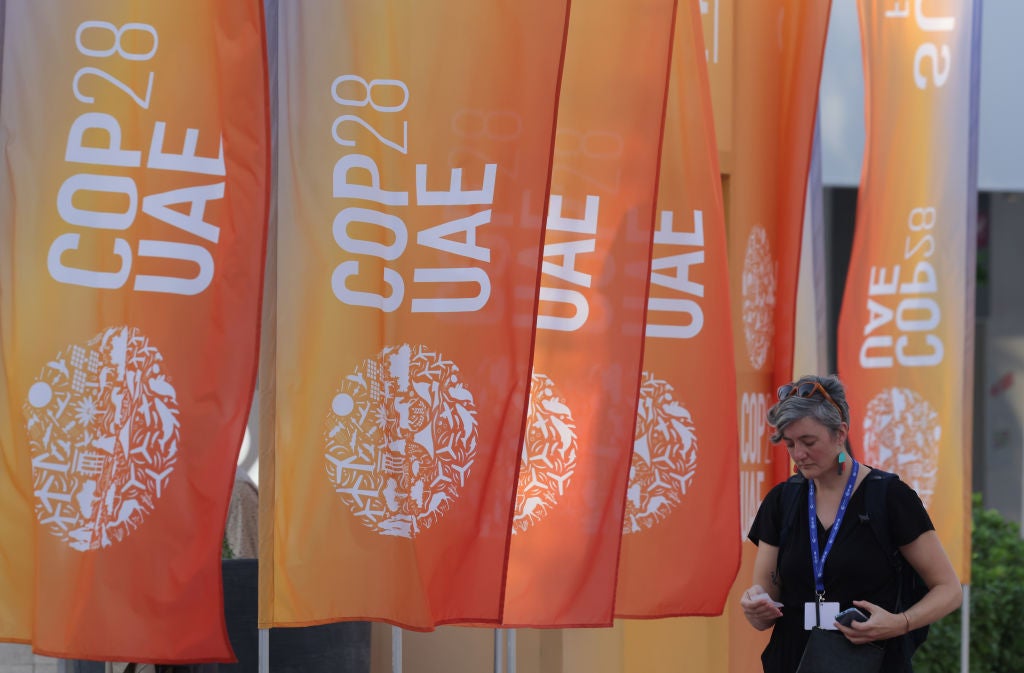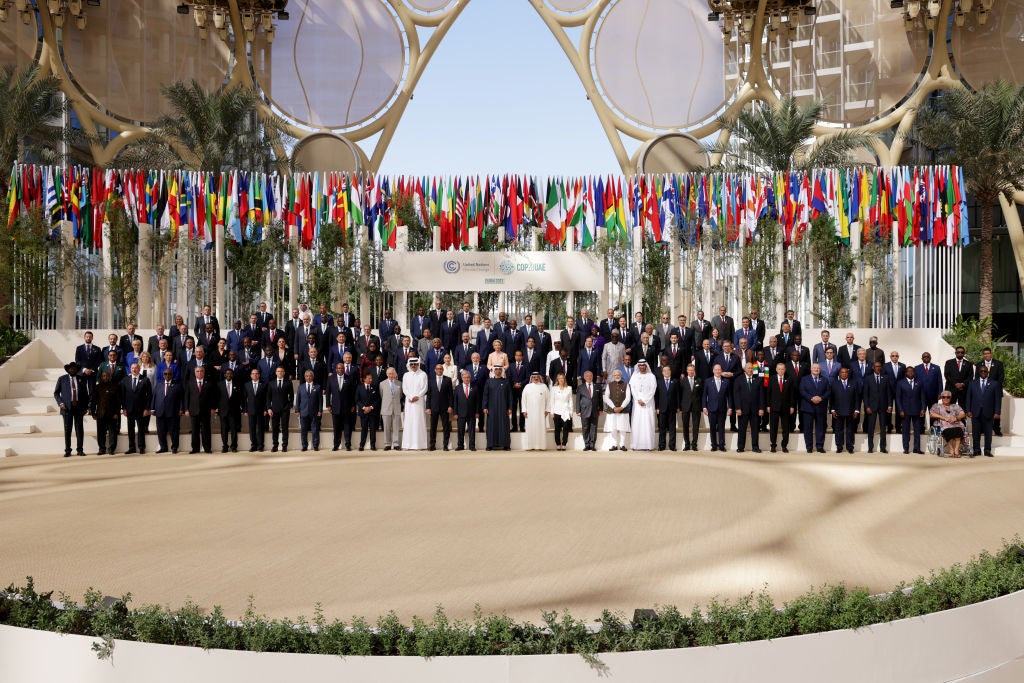
DUBAI – For people in the climate world, the annual two-week extravaganza that is COP28 is a moment to see and be seen – even if this particular event is bankrolled by oil and gas revenues. The COP is a chance to meet all the think tanks, businesses and policymakers you spend much of the year speaking to over Zoom. As a journalist, you get access like nowhere else: instead of being presented with a spokesperson or junior analyst, suddenly there is the CEO of an organisation right in front of you, ready to be cornered straight after a panel for a quick comment.
Much of the early days of COP28 – when more than 100 global leaders descended onto Dubai’s Expo City – could be spent celebrity-spotting. From the UK alone, PM Rishi Sunak, energy minister Claire Coutinho, former PM Tony Blair, leader of the opposition Keir Starmer, shadow climate minister Ed Milliband, and former chief secretary to the treasury were all spied by Energy Monitor.
“I’ve caught the bug – I enjoy it very much,” said former environment minister Therese Coffey, when asked by Energy Monitor why she was in attendance at this climate conference (her fifth), despite losing her ministerial portfolio a few weeks before.
“COP is great because instead of just having high-level debates and discussions, suddenly here is a forum where all countries and peoples with different needs and strengths converge,” she said. “There is a real chance to turn actions into ambition.”
Unlike previous COPs, such as COP27 (which ran out of water) or COP26 (where a plug or a place to sit down was worth its weight in gold), the Expo 2020 Centre that is hosting COP28 is a swish, multi-building outdoor complex, blessed with space, swanky food and drink facilities, and an army of attendants at the beck-and-call of the estimated 80,000 attendees.
Herein lies an uncomfortable irony. The UAE is able to put on a grand event like COP28, in a facility estimated to have cost $7bn, because of the vast oil and gas resources it is blessed with, which have for decades now given the government huge wealth to spend on high-profile events and flashy facilities.

The good times also look set to continue, with the economy growing 7.9% thanks to spiking oil production and high oil prices, according to the International Monetary Fund (IMF). GDP is expected to grow by 3.4% this year, and 4% next year.
The wealth that the UAE has compared to many of its Arab neighbours makes many in the country – perhaps understandably – unwilling to forsake the oil and gas that has been so valuable.
When asked what she thought of the UAE’s plans to continue producing oil and gas over the coming decades, one Emirati woman working at COP28 told Energy Monitor that she and her compatriots are mostly only grateful for the opportunities oil has provided to “build all of this”, gesturing to the shiny Expo buildings all around.
Opinions differed ahead of the COP over whether it was appropriate for a petrostate such as the UAE to host the conference, especially so given that the appointed president, Sultan Al Jaber, is also CEO of UAE state oil firm ADNOC.
The controversy came to a head four days into COP28, when it emerged that Al Jaber had claimed that there was “no science” which suggested fossil fuels must be phased out to meet our climate goals. He said this despite the fact that the latest UN Emissions Gap report makes it clear that CO2 released by burning fossil fuels represents around two-thirds of current greenhouse gas emissions.
“COP28 President Al Jaber’s science-denying statements are alarming and raise deep concerns about the Presidency’s capacity to lead the UN climate talks, at a time when leadership and a clear vision are most needed,” said Romain Ioualalen, global policy lead of the NGO Oil Change International, in response.
“Of course, denying science has been part of the fossil fuel industry’s playbook for decades. But science is not up for debate: we must phase out fossil fuels to have a liveable planet,” he added.
At a hastily organised press conference on Monday, however, Al Jaber rowed back on the comments saying: “I have said over and over the phase-down and the phase-out of fossil fuel is inevitable. In fact, it is essential.”
Ironically, the controversy over his earlier comments may have pushed the president to be more critical of fossil fuels than he might otherwise have been. At his opening address, he had called “[to] look for ways and ensure the inclusion of the role of fossil fuels”.
Discussions at COP28 have by-and-large been judged a success so far, with the establishment of a “loss and damage” fund to compensate low-income countries hit by extreme weather events, as well as an unprecedented pledge to triple global renewable capacity by 2030, which has been signed by some 118 countries. Data released by the presidency showed that over $57bn in climate finance had been mobilised in the first four days of the conference, ushering in a “new era for climate action”.
For many, however, the holy grail would be the inclusion of calls to “phase-out” fossil fuels in the final cover text of the conference, which is a key policy document all 198 parties to the UNFCCC will take back to their governments. The latest draft of the COP28 cover text, released on Tuesday morning, still included the language “phase-out”.
So far, the best parties have managed (at both COP26 and COP27) is a “phase-down” of “unabated coal”, with no mention of oil and gas. Al Gore said at COP28 that calling to phase out fossil fuels – in other words, oil and gas as well as coal – would be “one of the most significant events in the history of humanity”.
Ahead of COP28, many thought it unlikely such a thing could ever take place in the UAE. But with a cautious optimism in the air, an obvious desire from the UAE for the talks to be a success, and immense personal pressure on the president, perhaps it is not the impossibility it once seemed.



